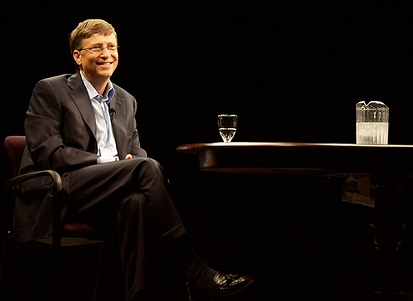Bill Gates' second life

During his interview with Charlie Rose as the TechNet Innovation Summit, Bill Gates really showed how he has found a new passion that isn't about software bits and bytes. It's quite amazing that Gates and his friend Warren Buffett, whose money is flowing in the $32 billion Bill & Melinda Gates Foundation, have taken their collective wealth and applied it to improving lives around the world, taking a step toward overcoming man's inhumanity to man.

Photo credit: Thomas Hawk
Gates described his initiation into the world of the have-nots. "In countries where a lot of kids are dying, it's always tough when you go in and realize how bad the situation is....What really blows my mind is when you know the stats and see what it represents...a million kids dying of malaria. It grabs me, and I have to put energy into this. It's wild that the awareness isn’t there," he said.
Gates gave an example of a plane crash that kills dozens and gets all the headlines, but thousands more kids dying each day is not reported--no big visual to splash on the page like a crash site to sell papers. "The stunning thing is to be there and understand how common these situations are, and they are not receiving the benefit from technology."
Gates had something to say about governments as well. "If the government setting is wrong, there is a modest amount you can do," Gates said, pointing to the oil-rich, but corrupt Nigerian government. Zimbabwe could have been the best example of a country emerging, but the government has driven it 15 years backwards from what it should been."
Rose asked Gates if he were optimistic about progress that could be made in solving problems of poverty and disease. "I started out naively optimistic, and now I am more concretely optimistic," he said.
Gates also gave a bit of 'travel' advice, "If any of you have to live on less than one dollar a day, go to Northern Thailand, but not urban Calcutta." He was giving the audience at the TechNet Summit a a sampling of life choices and conditions outside Silicon Valley or Redmond, where a dollar won't buy a cup of coffee or a lowly muffin.
At the end of the day, there is a virtuous cycle in bringing countries out of poverty, Gates said, starting with improving agriculture, which leads to building roads, education and literacy, and then introducing non-agricultural elements into the economy. "China is going through this, and Viet Nam is just going through it now," he said. China has become a world powerhouse and is unleashing its brain power to solve its problems, such as how to handle the massive movement of the population from the countryside to urban areas, and will hopefully contribute more to solving to global problems. The U.S. government could also take a lesson from The Bill & Melinda Gates Foundation, which is providing a blueprint for making the world a better place for all.